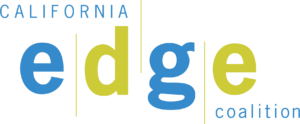For Immediate Release: Feb. 8. 2021
Contact:
Zima Creason
916-706-0160 ext 110
zcreason@caedge.org
Amid COVID-19 Disruptions, Leaders Look to New Ways to Meet Learners Where They Are
Study finds growing demand for flexible learning options in California beyond pandemic
SACRAMENTO, Calif. — As COVID-19 upends California’s education and workforce systems, community colleges, universities, labor groups, community-based organizations, workforce development leaders, and employers are seeking a more flexible postsecondary learning system that would remove access barriers and address longstanding equity concerns, according to a new study by the California EDGE Coalition.
In a survey of businesses, community colleges, universities, and community organizations across California, nearly three-quarters (74%) of respondents said the pandemic has created a greater need for flexible learning approaches. Eighty-nine percent cited heightened awareness of the importance of equity as rationale for expanding learning options.
“The COVID-19 pandemic and the inequities it has exposed makes clear that higher education cannot simply return to normal once this crisis subsides,” said Zima Creason, executive director of the California EDGE Coalition. “Flexible learning approaches provide a path to building a stronger, more equitable, and more accessible education system and economy. This report makes clear that doing so is both absolutely necessary and doable.”
While the pandemic has forced colleges and universities to temporarily change longstanding practices, the report shows that flexible learning options can play a critical role in improving access and equity beyond the current crisis.
Currently, more than 5.5 million Californian adults have completed some college, but do not have a credential or degree and are no longer enrolled. For these learners and millions more who are juggling personal and work responsibilities, fitting higher education into an already hectic schedule can be impossible. More flexible postsecondary learning approaches would enable Californians – regardless of their prior education and current life circumstances – to participate in postsecondary learning, achieve marketable skills, and obtain family-supporting careers.
The study focuses on two widely recognized flexible learning approaches – credit for prior learning (CPL) and competency-based education (CBE). CPL enables learners to obtain credit for experiences gained outside of college classrooms. CBE allows learners to engage and progress through education and training programs at their own pace, obtaining credit and/or credentials based on demonstrated competence.
In addition to surveying stakeholders about the need for flexible learning approaches, the report – Understanding Competency-Based Education, Credit for Prior Learning, and Other Flexible Learning Approaches in California – identifies essential practices for ensuring high-quality and equitable development, implementation, and outcomes; makes 23 policy recommendations; and sheds new light on the current state of implementation in California.
Key findings from the study include:
• The COVID-19 pandemic and increased equity consciousness are driving greater need for flexible learning approaches.
• There is keen interest in flexible learning approaches because of their potential promise for improving postsecondary and career outcomes, particularly for students of color and adult learners with disproportionately lower postsecondary participation and/or completion rates.
• There are important differences among stakeholder groups (colleges, employers, and community-based organizations) as to which rationales they consider most compelling and why.
• There are limited examples of flexible postsecondary education and training approaches being implemented in California and, of these, most are nascent.
• A multitude of distinct practices were identified as being “absolutely essential” for ensuring high-quality and equitable flexible learning approaches.
• Ten building blocks were identified as enabling conditions for seeding the development and growth of flexible learning approaches.
As the most-populous state and with its diverse learner population, California is uniquely positioned to lead the effort in building a postsecondary system that is more equitable, accessible, and responsive. Additionally, most of the state’s college and university students have attended courses entirely online since the start of the pandemic. This shows that a new, more personalized approach to postsecondary learning is possible. As one community college faculty member included in the study put it, “Now is the time to be creative as we’ve pushed the envelope on virtual learning.”
# # #
The California EDGE Coalition is a statewide advocacy organization that unites business, labor, social justice, education, and workforce organizations with a mission to build a broadly shared prosperity by advancing state workforce policies and investments to create economic mobility for all Californians.
